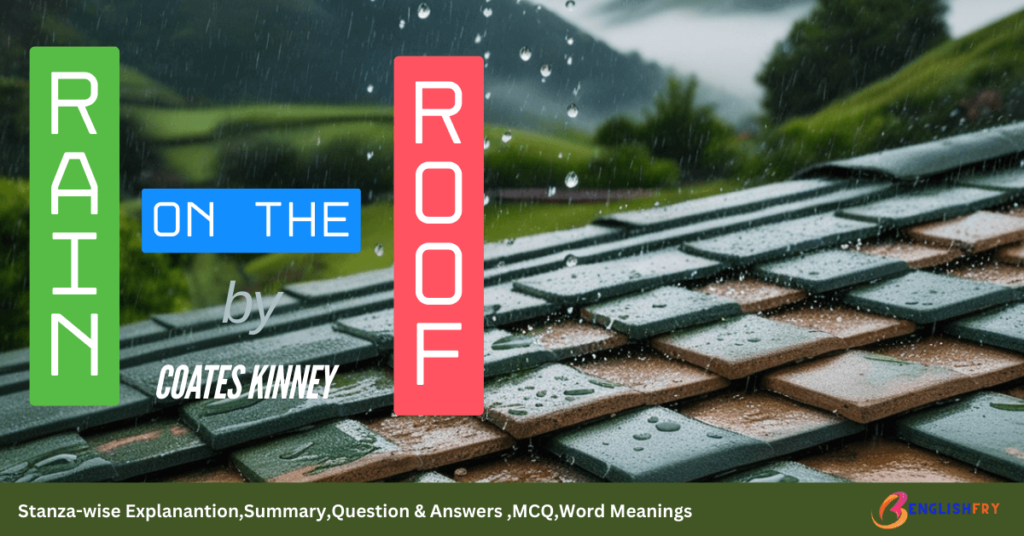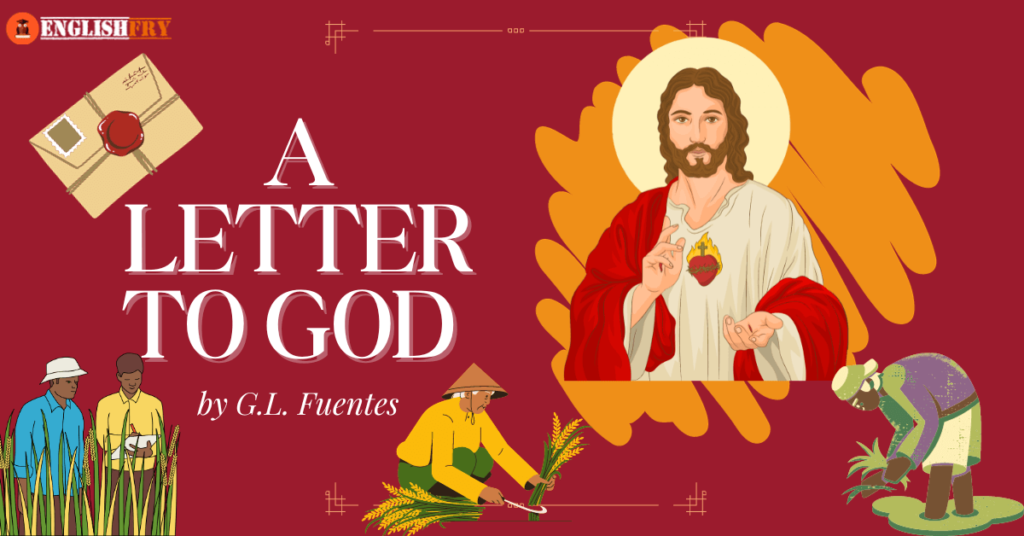Table of Contents
ToggleRain On The Roof About The Author
The poem has been written by Coates Kinney, who was born in New York and educated at Yellow Springs. Through this poem, the poet feels nostalgic as soon as raindrops fall on the roof.
He gets lost in the sweet memories of the past where he also compares the drops falling with the tears shed at dark nights. He also remembers his mother and how he used to sleep in her lap.
Rain On The Roof Central Theme
The poem has a central idea stored in as Kinney considered rain as the healer. The musical sound of the drops falling on the rooftop late at night. Through this, he was able to cherish the sweet memories of the past. The rain heals his mind of the busy life and takes him back to when he used to sleep in her mother’s lap.
Rain On The Roof Poem Explanation
Stanza1.
When the humid shadows hover
Overall the starry spheres
And the melancholy darkness
Gently weeps in rainy tears,
What a bliss to press the pillow
Of a cottage-chamber bed
And lie listening to the patter
Of the soft rain overhead!
Meanings
Humid: something which is full of moisture.
‘shadows’ refers to the moisture-laden clouds which cast a shadow on the earth.
hover: Move around something
melancholy: sad
bliss: Happiness
patter: the sound of raindrops falling on the roof.
Cottage chamber means the bedroom.
In the above stanza, the poet says that as soon as the humid shadows cover the sky. The poet meant to say that when the sky is filled with these moisture-carrying clouds, which are about to bring rain. The gloomy darkness that haunts the night moves away slowly.
The poet is also comparing the drops of rain to the tears falling from the eyes on dark gloomy nights. He further says that it seems to be a vouchsafe to lie down as the drops fall on the roof and listen to musical drops of falling raindrops.
Poetic devices
The rhyme scheme of the poem: abcbdefe
Stanza 1
Alliteration: The repetition of a consonant sound in two or more consecutive words.‘Humid Hover’ – ‘h’ sound is repeating ‘starry spheres’ – ‘s’ should be repeated ‘press pillow’- ‘p’ sound is repeating ‘lie listening’ – ‘l’ sound is repeating.
Onomatopoeia: The use of sound words to create a dramatic effect and auditory imagery. ‘Patter’ is the use of sound words. It is the sound made by the raindrops falling on the rooftop.
Personification: Treating a non – living thing as a living being, darkness has been personified when he says that it is sad.
Transferred Epithet: The use of an adjective with a noun when it refers to another noun. In ‘melancholy darkness’, the darkness is not melancholy, but it refers to the sad people.
Stanza2.
Every tinkle on the shingles
Has an echo in the heart;
And a thousand dreamy fancies
Into busy being start,
And a thousand recollections
Weave their air-threads into woof,
As I listen to the patter
Of the rain upon the roof.
Meanings
tinkle: short, light ringing sound
shingles: rectangular wooden tiles used on roofs
echo: repeated sound
woof: weft, i.es the thread woven across the loom
patter: the sound of raindrops falling on the roof
‘busy being’ refers to human beings and here, the poet is referring to himself
As soon as he hears the drops falling on the roof, he expresses that the sound falling on the rooftop echoes in his heart. In his dreams, he also makes some fancy imaginations related to this.
He also tries to collect and cherish the sweet memories of the past. So with every pitter-patter raindrops falling on his roof, his heart also stores that sound and takes him back to the past.
Poetic devices
1.Alliteration: The repetition of a consonant sound in two or more consecutive words.
‘busy being’ – ‘b’ sound is repeating
‘their thread’ – ‘th’ sound is repeating
‘rain roof’ – ‘r’ sound is repeating
- Onomatopoeia: The use of sound words to create a dramatic effect and auditory imagery.
‘tinkle’, ‘patter’ – sounds made by the raindrops.
- Personification: Treating a non – living thing as a living being.
recollection is personified when he says that they weave dreams.
- Transferred Epithet: The use of an adjective with a noun when it refers to another noun.
‘dreamy fancies’ does not mean that the fancies are dreamy but refers to the people who have dreams.
Stanza 3.
Now in memory comes my mother,
As she used in years agone,
To regard the darling dreamers
Ere she left them till the dawn:
O! I feel her fond look on me
As I list to this refrain
Which is played upon the shingles
By the patter of the rain.
Meanings
ere: old poetic word for ‘before’
dawn: daybreak
list: old poetic word for’ listen’
refrain: a repeated part of a song or a poem; here, the sound of the rain
In the above stanza, the poet also remembers his mother and feels her presence as he used to lie in her lap. It also brings those memories in the past and feels nostalgic as the raindrops fall on his rooftop. She used to love him and let him sleep so that he could dream.
The poet can still feel her presence as the drops of the sound fall on the roof. The sound relates him to his past and whenever he listens he gets nostalgic and gets lost in his fancy world.
Poetic devices
1.Alliteration: The repetition of a consonant sound in two or more consecutive words.
‘memory my mother’ – ‘m’ sound is repeating
‘Darling dreamers’ – ‘d’ sound is repeating
- Onomatopoeia: The use of sound words to create a dramatic effect and auditory imagery.
‘patter’ – the sound of raindrops falling on the shingles of the roof.
Question 1.
What is the setting of the poem?
Answer:
The poet is lying comfortably snug in his bed with his head pressed against the pillow, in a room in his cottage listening to the patter of the soft rain as it falls on the shingles of the roof.
Question 2.
How old do you think the poet is? Justify your answer.
Answer:
The poet is a young man. He remembers his mother looking down at him and his siblings, who are sleeping in their room, long ago. The poet’s mother also is no longer alive as he says she lives on in his memories.
Question 3.
How does the sky look before the rain falls?
Answer:
Before the rain falls, the weather turns humid and great dark clouds gather in the sky. They cover the stars and spread darkness. The poet feels these dark clouds are gloomy and melancholic. To the poet the darkness spells despondence and gloom as the clouds – humid shadows – weep gentle tears that fall as rain.
Question 4.
‘And the melancholy darkness gently weeps in rainy tears.’ Explain the phrase ‘melancholy darkness’. What does it do?
Answer:
“Melancholy darkness” refers to the dark rain bearing clouds. The poet imagines that the clouds covering the sky are gloomy and depressed because they are heavy and grey. The poet further imagines that the clouds are weeping and their tears are falling down as rain drops.
Question 5.
What is a ‘bliss’ for the poet in the poem ‘Rain on the Roof?
Answer:
The poet thinks it is blissful to lie in his cozy bed with his head on the pillow and listen to the sound of rain falling on the shingles of the roof. He enjoys the music of nature which arouses fantasies and memories in his mind.
Question 6.
What does the poet like to do when it rains?
Answer:
The poet likes to lie in his room in his cottage, snug in bed with his head on a pillow when it rains. It gives him the greatest pleasure.
Question 7.
What feelings does the falling rain arouse in the poet in the poem ‘Rain on the Roof?
Answer:
The poet first describes the falling rain as the tears of the dark, gloomy clouds. However, as he lies snug in his bed, listening to the patter of rain on the shingles, the sound provides him immense pleasure and he is lost in fantasies and memories.
Question 8.
What are the poet’s feelings as the rain falls on the shingles?
Answer:
As the rain falls on the shingles, its tinkling sound creates an echo in the poet’s heart. As he listens to the patter of the raindrops on the roof, his gloom is lifted and his heart is filled with a thousand fantasies and fond memories of his mother.
Question 9.
When do the ‘thousand dreamy fancies’ begin to weave in the poet’s mind? What are these fancies?
Answer:
When the poet is in his cottage and lies in his cozy bed listening to the soft music of rain on the roof, his mind is flooded with various thoughts and imaginations. These fancies or imaginary thoughts and ideas spin threads of bright fanciful colours in his mind.
Question 10.
“And a thousand dreamy fancies into busy heart.” When do the ‘thousand dreamy fancies’ begin in the poet’s heart?
Answer: When the poet is in his cottage and lies in his cozy bed listening to the soft music of rain on the roof, his mind is flooded with various thoughts and imaginations. The soothing sound of the gentle rain on the shingles fires his imagination.
Question 11.
‘Now in memory comes my mother.’ When does the poet remember his mother? What does it show about him?
Answer:
As the poet lies in his bed in his room in the cottage, listening to the sound of The poet loved his mother. He remembered her when he lied on his cozy bed to enjoy the sound of rain. It appears to him as if she was fondly looking at him.
Question 12.
‘As I list to this refrain.’ Which kind of refrain is the poet referring to?
Answer:
The poem is lying in his cozy bed in his cottage listening to the sound of rain falling incessantly on the roof of his cottage. Here, refrain refers to the continuous patter of the rain falling on the shingles of his roof.
Question 13.
What feeling does every tinkle on the shingle create for the poet?
Answer:
Every raindrop falling on the tiles of tile roof creates a rhythm with the poet’s heartbeat. This evokes thousands of dreams making his thoughts busy. While he focuses on the listening to the pitter- patter on the roof, his mind starts weaving recollections of fond memories of yesteryears.
Question 14.
How does the poet describe the falling rain in the poem ‘Rain on the Roof?
Answer:
The poet first describes the falling rain as the tears of clouds. The dark rain bearing clouds appear gloomy and depressed to him. Therefore, they are weeping. Their tears fall to earth as gentle rain. However, as he listens to the patter of rain on the shingles, it provides him immense pleasure. The poet loves to hear the melodious sound of nature. He listens to the patter of soft rain on the wooden roof and is lost in fantasies. He considers it a rare happiness to listen to the patter of the rain on the roof. Rain brings to his mind memories of long gone days when he was a child, and he lay sleeping in his room along with his siblings, as his mother gazed down at them with love.
Question 15.
How does the rain affect the poet? Describe.
Answer:
Though at first the sight of the gathering dark clouds fills the poet’s mind with dismay and unhappiness, the gentle patter of the rain falling on his roof soon soothes him. The poet lies in his cozy bed, his head on his pillow and listens to the patter of the raindrops on the shingles. The gentle sound ills him with bliss. A thousand fantasies fill his mind. He is filled with nostalgia as he remembers his mother. He recalls how his mother had looked at him and his sleeping siblings with fondness as they lay in their beds. Hence, the rain is a bliss for the poet.
Question 16.
What happens when the poet listens to the patter of the rain? Do you think that rain is a narrative tool in the poet’s life?
Answer:
The raindrops play music on the roof and create a tinkling sound on the shingles. To the poet this music is blissful. At the beginning of the poem there is certain tinge of sadness, and the poet
talks of “melancholy darkness/ Gently weeps in rainy tears’. However, as he lies in his cozy bed, a feeling of bliss washes over him. Every raindrop on the tiles of the roof creates a rhythm with
the poet’s heartbeat. The poet tries to focus on listening to the pitter-patter on the roof whereas his mind weaves the recollections of fond memories of yester years. Rain bears a subtle link with all aspects of life. It serves as a powerful narrative tool in the poet’s life as it evokes fantasies and nostalgia in the poet. He recalls his mother in a poignant manner.
Founder of Englishfry.com, a captivating and knowledge-driven blog & Founder of Android app/website Studyfunnel.com, an online Mock Test Series Portal. With a wealth of experience spanning over 16+ years, he has excelled as an Ex-Asst.Professor, Teacher, Amazon published author, Website Developer, Graphic Designer,Blogger,Poet, and Creative academic content writer publisher of 4 academic books available Online on Amazon & Flipkart. His tryst in Literature helped him realize his love for writing and telling stories. A tech-savvy language nerd by day and, a passionate writer by night, he now translates his experiences into tales of wisdom served with a side of humor.His widely recognized profound insights ,captivating writing style of weaving words make him contribute to prestigious publications and a sought-after authority in the field that transport readers to extraordinary worlds.








